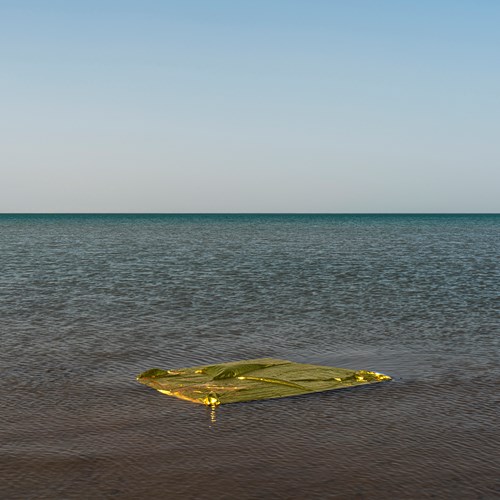Yalda Eskandari
17 Jun - 8 Jul, 2022

Statement:
n the old days of colonialism, salves that were kept in horrible conditions of the houses of slaves in order to get used to them, had to go through a door called "door of no return." After that, they would set their feet on the hot sands of the beach, then they were led to slave ships, in which they were crumbled again to be carried to a destination, from which they could never get back. The endless sea is an area that separates that door of no return and the fragmented images of the dream of a developed land. In the “Door of No Return” installation, set in the spaces of Mohsen Projects, Yalda Eskandari presents a reading of the history of colonialism, juxtaposed with the experience of contemporary forced migration. Although slave houses have now become museums of anthropology and ethnography, many people are still standing on the threshold of the same door to sail the sea, beyond which they will always be outsiders. The sea, moreover, is a non-place, which, due to the disintegration of “self” and identity transformation, has little room for expressing subjectivity and forming memories.///
"Door of No Return," on display in spaces of Pasio, Room 1, Room 2, and Room 3, represents jump-cuts to the to the experience of forced migration. Encountering the installation in Pasio, one sees a brief overview of the migration process and what is subsided from the migrating subject along the way. In Room 1, the inner perspectives of the individuals are shattered and their connection with themselves are disrupted. In Room 2, the audience experience the highest level of imbalance and objectivity of a non-place. Room 3 represents an imaginary picture of the destination. Even when it is not an ideal place, destination often invokes a sense of arriving and ending a journey. In this space, however, everything is set in a contradictory fashion, as light, security, and warmth have been emptied of their meanings. Ultimately, a beautified image of a painful transformation following neo-colonialism is presented. This project is an attempt to bring to light the lost aspects of the migration process. The ship may never reach the shore, and if it does, the passengers may never feel like home again, even though they walk the warm sands of the shore



